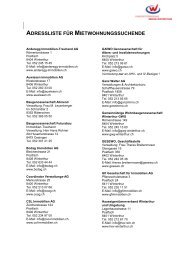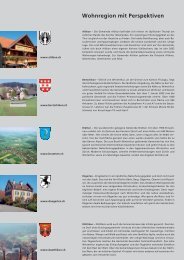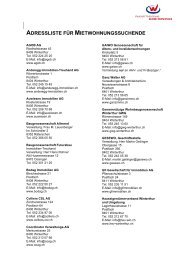Handbook for Investors. Business location in Switzerland.
Handbook for Investors. Business location in Switzerland.
Handbook for Investors. Business location in Switzerland.
You also want an ePaper? Increase the reach of your titles
YUMPU automatically turns print PDFs into web optimized ePapers that Google loves.
Fig. 38: Cooperation between employers and employees (2008)<br />
1 = total confrontation, 7 = total cooperation<br />
Average: 4.5<br />
1 S<strong>in</strong>gapore 6.3<br />
2 <strong>Switzerland</strong> 6.1<br />
3 Denmark 6.0<br />
4 Sweden 5.9<br />
5 Austria 5.8<br />
8 Hong Kong SAR 5.7<br />
9 Netherlands 5.7<br />
10 Japan 5.7<br />
12 Luxembourg 5.4<br />
23 Ireland 5.1<br />
24 Germany 5.0<br />
25 UK 5.0<br />
26 USA 5.0<br />
40 India 4.7<br />
60 Ch<strong>in</strong>a 4.5<br />
73 Belgium 4.3<br />
87 Brazil 4.2<br />
97 Russia 4.1<br />
123 Italy 3.5<br />
126 France 3.5<br />
Source: The Global Competitiveness Report 2009 – 2010, World Economic<br />
Forum<br />
Declaration of general applicability of collective barga<strong>in</strong><strong>in</strong>g<br />
agreements<br />
www.seco.adm<strong>in</strong>.ch<br />
Search under: Gesamtarbeitsverträge (collective barga<strong>in</strong><strong>in</strong>g<br />
agreements)<br />
Languages: German, French, Italian<br />
8.3.3 Employee participation and employee representation<br />
The Co-Determ<strong>in</strong>ation Act governs the participation of employees<br />
<strong>in</strong> a company and applies to all private companies with employees<br />
<strong>in</strong> <strong>Switzerland</strong>, regardless of their size. Participation consists<br />
ma<strong>in</strong>ly of provid<strong>in</strong>g <strong>in</strong><strong>for</strong>mation to and listen<strong>in</strong>g to employees.<br />
Employers must <strong>in</strong><strong>for</strong>m employees of all significant circumstances,<br />
new developments and/or changes. Employees have the right<br />
to take their questions and/or comments to their employer and<br />
make suggestions. The act also governs the elections of employee<br />
representation committees. Any company may have a committee,<br />
but there is no requirement to have one. Employers need only <strong>in</strong><strong>for</strong>m<br />
or consult the affected employees <strong>in</strong> the follow<strong>in</strong>g <strong>in</strong>stances:<br />
• <strong>in</strong> all matters relat<strong>in</strong>g to work safety and worker protection<br />
• on the transfer of operations<br />
• <strong>in</strong> the event of mass redundancies<br />
Works councils <strong>in</strong> the EU have far greater powers than employee<br />
representation committees under Swiss law. The major difference<br />
is that, <strong>in</strong> contrast to works councils, Swiss employee representative<br />
committees are not able to push through their own views<br />
or to <strong>for</strong>ce a decision. Their rights are limited to be<strong>in</strong>g <strong>in</strong><strong>for</strong>med,<br />
hav<strong>in</strong>g their views heard and provid<strong>in</strong>g decision-mak<strong>in</strong>g <strong>in</strong>put.<br />
8.4 Work<strong>in</strong>g hours and leisure time<br />
8.4.1 Normal work<strong>in</strong>g hours, maximum work<strong>in</strong>g hours and<br />
work<strong>in</strong>g time models<br />
Employment contracts or collective barga<strong>in</strong><strong>in</strong>g agreements<br />
generally stipulate that normal work<strong>in</strong>g hours <strong>for</strong> employees <strong>in</strong><br />
<strong>Switzerland</strong> are 40 to 44 per week. The legal maximum work<strong>in</strong>g<br />
time <strong>in</strong> <strong>Switzerland</strong> has rema<strong>in</strong>ed stable over many decades.<br />
The maximum work<strong>in</strong>g hours per week are 45 <strong>for</strong> <strong>in</strong>dustrial firms<br />
(also applies to office staff and other employees). For commercial<br />
operations, the maximum is 50 hours per week. The law provides<br />
<strong>for</strong> longer hours <strong>for</strong> certa<strong>in</strong> professions, such as taxi drivers and<br />
junior doctors. This differentiation between normal and maximum<br />
work<strong>in</strong>g hours is important <strong>for</strong> the def<strong>in</strong>ition of overtime.<br />
In practice, there are many ways of adapt<strong>in</strong>g work<strong>in</strong>g hours to<br />
the needs of a bus<strong>in</strong>ess, <strong>for</strong> example, flex-time, the range model,<br />
two/multiple-shift operation or cont<strong>in</strong>uous operation (7 x 24 hours<br />
x 365 days) are all possibilities. In particular, <strong>in</strong> the case of the need<br />
<strong>for</strong> cont<strong>in</strong>uous operation, the daily and weekly maximum hours can<br />
be extended and break times can be distributed differently.<br />
8.4.2 Overtime and excess hours<br />
The difference between normal and maximum work<strong>in</strong>g hours is<br />
referred to as overtime. Employees are obliged to per<strong>for</strong>m such<br />
overtime to the extent that they are able to do so and which<br />
they may be reasonably expected to per<strong>for</strong>m. By law, overtime<br />
must be paid at a premium of 25 %. It is possible, however, <strong>for</strong><br />
the premium to be waived <strong>in</strong> writ<strong>in</strong>g. Instead of overtime pay, the<br />
employee may be compensated through time <strong>in</strong> lieu of at least<br />
the same duration, provided the employer and employee mutually<br />
agree to this. For employees <strong>in</strong> managerial positions it is possible<br />
to compensate overtime generally through normal salary.<br />
72 <strong>Handbook</strong> <strong>for</strong> <strong>Investors</strong> 2010









